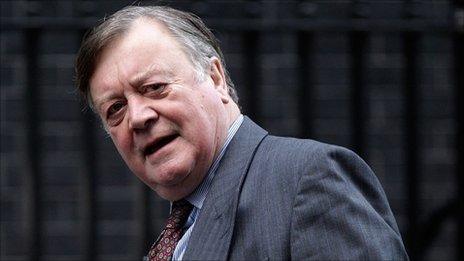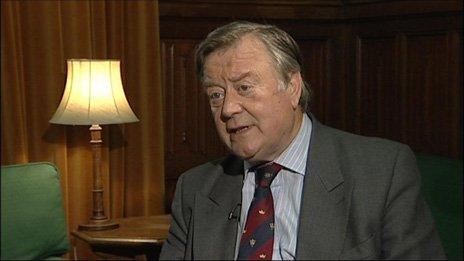Ken Clarke urged to stand down over sentencing plans
- Published

Ken Clarke has been under pressure since remarks he made about rape cases
Justice Secretary Ken Clarke has been urged to stand down by a Tory MP so the party can restore its reputation as a "party of law and order".
Philip Davies was one of five Tory MPs who voted against Mr Clarke's proposals which could halve the prison terms of criminals who plead guilty early on.
But Mr Clarke dismissed the debate - called by Labour - as a "slightly pathetic" example of bandwagon jumping.
And he said he had no plans to cut sentences for convicted criminals.
Mr Clarke last week faced calls to resign by Labour leader Ed Miliband after he appeared to suggest in a BBC interview that some rapes were more serious than others.
'Comic'
He later clarified the remarks and apologised if they had been misunderstood. Later on Tuesday, he will have a private meeting with a rape victim who criticised his policies on BBC Radio 5 Live.
Labour sought to keep the pressure on Mr Clarke over sentencing in the Commons on Monday, by holding an opposition day debate on his proposals to increase the maximum sentence "discount" available to criminals who plead guilty.
Mr Clarke accused Mr Miliband of "wandering the streets looking for a passing bandwagon".
"There was no loud opposition at all to the principle of the proposal until last week.
"The rush for this debate is slightly pathetic and slightly comic," he told MPs.
He said the aim of the proposals to increase the number of guilty pleas - and so reduce the "unpleasantness" of the court experience for victims and witnesses, as well as increasing the efficiency of the system.
"Although most cases wind up with guilty pleas, more should do so and far too many such pleas are made ages after the event and at the last possible moment," he told MPs.
He said judges would "continue to have discretion in setting the appropriate sentence in individual cases" and there would be no reductions in sentences for those convicted.
'No evidence'
The proposals, contained in a Green Paper, are still under consideration, but had been backed by Prime Minister David Cameron, said the justice secretary.
But Philip Davies said there was "widespread opposition" to the idea that offenders who plead guilty at the earliest opportunity could see the jail term halved - up from the current 33% maximum discount in some cases.
"These proposals have to go," said the Shipley MP.
"And I very much fear that if the Secretary of State doesn't listen to the widespread opposition to these plans, for us to restore our reputation as a party of law and order, he will have to go as well.
"This is simply an arbitrary proposal. There is absolutely no evidence at all behind this proposal to suggest that more people will plead guilty as a result."
The Ministry of Justice estimates the discount policy would save 3,400 prison places - and £130m - per year by 2015. That saving represents 62% of the £210m a year it has promised to cut.
'Recipe for disaster'
For Labour, shadow justice secretary Sadiq Khan said Mr Clarke's decision to accept a 20% cut in his budget had "led to a fixation with reducing the prison population".
He said the desire to do so by cutting jail terms, rather than by cutting crime, showed the government "knows the price of everything but the value of nothing".
"Nothing in these plans will reduce reoffending or do justice. They are a recipe for disaster that confirms how out of touch this government is with the real world," Mr Khan added.
The Labour motion opposing the policy was defeated by 221 to 303.
Following the vote, Justice Minister Crispin Blunt said the opposition motion was "a good example of how not to debate or create public policy in this area".
"There is a growing appreciation and understanding that the simplicity of the opposition motion cannot do justice to the complexity of issues and the factors we must reconcile," he said.
"The motion is outside any proper context and is premature, prejudging proper consideration of our policies as a whole."
- Published19 May 2011

- Published18 May 2011

- Published14 July 2014
